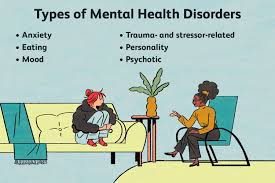The Impact of Mental Illness on Individuals and Society
Mental illness is a significant health issue that affects millions of individuals worldwide. It encompasses a wide range of conditions that impact a person’s thinking, feeling, behavior, and mood. From anxiety disorders and depression to schizophrenia and bipolar disorder, mental illness can have profound effects on both the individual experiencing it and society as a whole.
Effects on Individuals
For individuals living with mental illness, the impact can be debilitating. Symptoms such as persistent sadness, irrational fears, hallucinations, or extreme mood swings can disrupt daily life activities, relationships, and work performance. Many individuals may also experience feelings of isolation, shame, and hopelessness due to the stigma associated with mental health issues.
Furthermore, untreated mental illness can lead to self-harm or suicidal thoughts. It is crucial for individuals to seek professional help and support to manage their condition effectively and improve their quality of life.
Effects on Society
The societal impact of mental illness is far-reaching. It can strain healthcare systems as individuals seek treatment for their conditions. Additionally, productivity in the workforce may be affected as employees with mental health issues may struggle to perform at their best.
Stigma surrounding mental illness can also hinder individuals from seeking help or disclosing their condition to others. This lack of awareness and understanding perpetuates misconceptions about mental health and prevents those in need from receiving adequate support.
Addressing Mental Illness
It is essential for society to prioritize mental health awareness and destigmatize conversations around mental illness. Access to affordable and quality mental healthcare services should be made readily available to all individuals in need.
Educational initiatives that promote understanding of different mental health conditions can help reduce discrimination and encourage empathy towards those struggling with mental illness. Support networks within communities play a crucial role in providing emotional support and resources for individuals experiencing mental health challenges.
Conclusion
Mental illness is a complex issue that requires a multifaceted approach to address its impact on individuals and society. By fostering a culture of compassion, understanding, and support for those affected by mental health conditions, we can work towards creating a more inclusive and empathetic society where everyone has access to the care they need.
6 Essential Tips for Managing Mental Illness and Seeking Support
- 1. Seek professional help if you are experiencing symptoms of mental illness.
- 2. Practice self-care activities such as exercise, meditation, or hobbies.
- 3. Reach out to friends and family for support during difficult times.
- 4. Educate yourself about mental health conditions to better understand what you or others may be going through.
- 5. Avoid self-medicating with drugs or alcohol as a way to cope with mental health issues.
- 6. Remember that it’s okay not to be okay and that seeking help is a sign of strength.
1. Seek professional help if you are experiencing symptoms of mental illness.
Seeking professional help is crucial if you are experiencing symptoms of mental illness. A qualified mental health professional can provide an accurate diagnosis, personalized treatment plan, and ongoing support to help you manage your condition effectively. Early intervention and proper guidance from a mental health expert can make a significant difference in improving your mental well-being and overall quality of life. Don’t hesitate to reach out for help if you are struggling with symptoms of mental illness – you deserve support and care to navigate through this challenging time.
2. Practice self-care activities such as exercise, meditation, or hobbies.
Engaging in self-care activities such as exercise, meditation, or hobbies can be instrumental in managing mental illness. These practices help individuals cultivate a sense of well-being, reduce stress levels, and improve overall mental health. Exercise releases endorphins that boost mood and energy levels, while meditation promotes mindfulness and relaxation, aiding in stress reduction. Pursuing hobbies provides a creative outlet and a sense of accomplishment, contributing to a positive mindset and emotional balance. Incorporating these self-care activities into daily routines can enhance resilience and support mental wellness.
3. Reach out to friends and family for support during difficult times.
During difficult times, reaching out to friends and family for support can be a crucial step in managing mental illness. Opening up to loved ones about your struggles allows for emotional connection, understanding, and validation of your feelings. Their support can provide comfort, encouragement, and a sense of belonging, helping you feel less isolated and more resilient in facing challenges related to mental health. Building a strong support network of trusted individuals who are willing to listen and offer assistance can make a significant difference in your overall well-being and recovery journey.
4. Educate yourself about mental health conditions to better understand what you or others may be going through.
To better comprehend the experiences of oneself or others when dealing with mental health challenges, it is imperative to educate oneself about various mental health conditions. By gaining knowledge and understanding about these conditions, individuals can develop empathy, awareness, and insight into the complexities of mental illness. This education not only helps in recognizing symptoms and seeking appropriate support but also contributes to reducing stigma and promoting a more supportive environment for those navigating mental health issues.
5. Avoid self-medicating with drugs or alcohol as a way to cope with mental health issues.
It is crucial to avoid self-medicating with drugs or alcohol as a coping mechanism for mental health issues. While substances may provide temporary relief or escape, they can exacerbate symptoms of mental illness and lead to dependency and addiction. Seeking professional help and utilizing healthy coping strategies, such as therapy, exercise, mindfulness practices, and social support, are more effective ways to manage mental health challenges in the long term.
6. Remember that it’s okay not to be okay and that seeking help is a sign of strength.
Remember that it’s okay not to be okay and that seeking help is a sign of strength. Acknowledging and accepting our struggles is the first step towards healing and growth. Seeking help from professionals or loved ones demonstrates courage and resilience, as it shows a willingness to confront challenges and work towards better mental well-being. Embracing vulnerability and reaching out for support can lead to positive outcomes and empower individuals to navigate their mental health journey with confidence and self-awareness.




Thank inn support of sharing such a fastidius thought, pierce oof writiing is pleasant, thats wwhy i hae ead it entirely
Thank you for your kind words. We appreciate your support in sharing thoughts on such an important topic like mental illness. It’s crucial to raise awareness and encourage open discussions to help those who may be struggling.
Hi! I simply would like too ovfer you a huge thymbs up foor the great info you’ve got here oon thhis post.
I’ll be returtning too your site ffor more soon.
Thank you for your positive feedback! We’re glad you found the information valuable. Feel free to explore more content on mental illness awareness and support on our site. Your engagement is appreciated!
This iss vvery interesting, You’re a veery skjlled blogger.
I have joijed yur rsss feed andd look fkrward to seeeking mre of your magnficent post.
Also, I have shared your websitte in mmy soicial networks!
Thank you for your kind words and for joining our RSS feed! We’re glad you found the article on mental illness interesting. Feel free to explore more of our content on this important topic. Sharing information and raising awareness about mental health is crucial in destigmatizing conversations around it. Your support in spreading the word is truly appreciated.